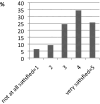Cancer patients' perspective on shared decision-making and decision aids in oncology
- PMID: 33682014
- PMCID: PMC8076112
- DOI: 10.1007/s00432-021-03579-6
Cancer patients' perspective on shared decision-making and decision aids in oncology
Abstract
Purpose: Shared Decision-Making (SDM) enhances patients' satisfaction with a decision, which in turn increases compliance with and adherence to cancer treatment. SDM requires a good patient-clinician relationship and communication, patients need information matching their individual needs, and clinicians need support on how to best involve the individual patient in the decision-making process. This survey assessed oncological patients' information needs and satisfaction, their preferred information in patient decision aids (PDAs), and their preferred way of making decisions regarding their treatment.
Methods: Questionnaires were distributed among attendees of a lecture program on complementary and alternative medicine in oncology of which 220 oncological patients participated.
Results: Participants reported a generally high need for information-correlating with level of education-but also felt overwhelmed by the amount. The latter proved particularly important during consultation. Use of PDAs increased satisfaction with given information but occurred in less than a third of the cases. Most requested contents for PDAs were pros and cons of treatment options and lists of questions to ask. The vast majority of patients preferred SDM to deciding alone. None wanted their physician to decide for them.
Conclusions: There is a high demand for SDM but a lack of conclusive evidence on the specific information needs of different types of patients. Conversation between patients and clinicians needs encouragement and support. PDAs are designed for this purpose and have the potential to increase patient satisfaction. Their scarce use in consultations calls for easier access to and better information on PDAs for clinicians.
Keywords: Complementary and alternative medicine; Oncological patients; Patient decision aids; Patient satisfaction; Patient-clinician communication; Shared decision-making.
Conflict of interest statement
The authors declare no conflicts of interest. This research did not receive any specific grant from funding agencies in the public, commercial, or not-for-profit sectors.
Figures




Similar articles
-
Can We Enhance Shared Decision-making for Periacetabular Osteotomy Surgery? A Qualitative Study of Patient Experiences.Clin Orthop Relat Res. 2025 Jan 1;483(1):120-136. doi: 10.1097/CORR.0000000000003198. Epub 2024 Jul 23. Clin Orthop Relat Res. 2025. PMID: 39051876
-
Examining How Technology Supports Shared Decision-Making in Oncology Consultations: Qualitative Thematic Analysis.JMIR Cancer. 2025 Jun 11;11:e70827. doi: 10.2196/70827. JMIR Cancer. 2025. PMID: 40499161 Free PMC article.
-
Decision aids for people facing health treatment or screening decisions.Cochrane Database Syst Rev. 2011 Oct 5;(10):CD001431. doi: 10.1002/14651858.CD001431.pub3. Cochrane Database Syst Rev. 2011. Update in: Cochrane Database Syst Rev. 2014 Jan 28;(1):CD001431. doi: 10.1002/14651858.CD001431.pub4. PMID: 21975733 Updated.
-
Shared decision-making interventions for people with mental health conditions.Cochrane Database Syst Rev. 2022 Nov 11;11(11):CD007297. doi: 10.1002/14651858.CD007297.pub3. Cochrane Database Syst Rev. 2022. PMID: 36367232 Free PMC article.
-
Decision aids for people facing health treatment or screening decisions.Cochrane Database Syst Rev. 2017 Apr 12;4(4):CD001431. doi: 10.1002/14651858.CD001431.pub5. Cochrane Database Syst Rev. 2017. Update in: Cochrane Database Syst Rev. 2024 Jan 29;1:CD001431. doi: 10.1002/14651858.CD001431.pub6. PMID: 28402085 Free PMC article. Updated.
Cited by
-
Patient Preferences Influencing Treatment Decision-Making in Early-Stage Breast Cancer in Germany, Italy, and Japan.Patient Prefer Adherence. 2024 Jul 25;18:1517-1530. doi: 10.2147/PPA.S450316. eCollection 2024. Patient Prefer Adherence. 2024. PMID: 39081589 Free PMC article.
-
Rationalizing the Influence of Co-Design on Distress, Clinical Decision-Making and Disease Self-Management of Cancer Patients-as-Partners: A Quasi-Experimental Study.Health Expect. 2024 Jun;27(3):e14113. doi: 10.1111/hex.14113. Health Expect. 2024. PMID: 38872504 Free PMC article.
-
Comparative overall survival of CDK4/6 inhibitors in combination with endocrine therapy in advanced breast cancer.Sci Rep. 2024 Feb 7;14(1):3129. doi: 10.1038/s41598-024-53151-8. Sci Rep. 2024. PMID: 38326452 Free PMC article.
-
Illness trajectories of incurable solid cancers.BMJ. 2024 Mar 1;384:e076625. doi: 10.1136/bmj-2023-076625. BMJ. 2024. PMID: 38428972 Free PMC article. No abstract available.
-
Policies and Practices to Address Cancer's Long-Term Adverse Consequences.J Natl Cancer Inst. 2022 Aug 8;114(8):1065-1071. doi: 10.1093/jnci/djac086. J Natl Cancer Inst. 2022. PMID: 35438165 Free PMC article.
References
-
- Ankolekar A, Vanneste BGL, Bloemen-Van Gurp E, van Roermund JG, van Limbergen EJ, van de Beek K, Marcelissen T, Zambon V, Oelke M, Dekker A, Roumen C, Lambin P, Berlanga A, Fijten R (2019) Development and validationof a patient decision aid for prostate cancer therapy: from paternalisitc towards participative shared decision making. BMC Med Inform Decis Mak 19:130. 10.1186/s12911-019-0862-4 - PMC - PubMed
-
- Beauchamp TL, Childress JF (2009) Principles of biomedical ethics. Oxford University Press, New York, Oxford
-
- Berger S, Braehler E, Ernst J (2012) The health professional–patient-relationship in conventional versus complementary and alternative medicine. A qualitative study comparing the perceived use of medical shared decision-making between two different approaches of medicine. Patient Educ Couns 88:129–137. 10.1016/j.pec.2012.01.003 - PubMed
-
- Brown R, Butow P, Wilson-Genderson M, Bernard J, Ribi K, Juraskova I (2012) Meeting the decision-making preferences of patients with breast cancer in oncology consultations: impact on decision-related outcomes. J Clin Oncol 30:857–862. 10.1200/JCO.2011.37.7952 - PubMed
-
- Butow P, Devine R, Boyer M, Pendlebury S, Jackson M, Tattersall MHN (2004) Cancer consultation preparation package: changing patients but not physicians is not enough. J Clin Oncol 22:4401–4409 - PubMed
MeSH terms
LinkOut - more resources
Full Text Sources
Other Literature Sources
Medical
Miscellaneous

